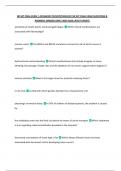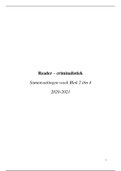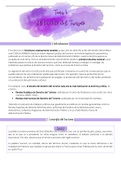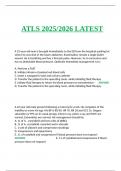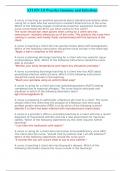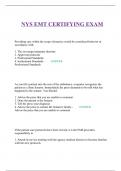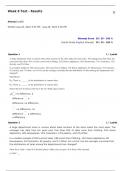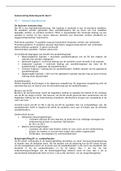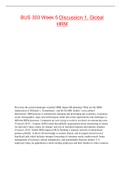“The strengths of Irenaeus’ theodicy outweigh the weaknesses.” Discuss. (40
Marks)
When assessing the claim that the strengths of Irenaeus’ theodicy outweigh the
weaknesses, I shall outline his view that the presence of evil in the world is due to the
individual’s inherent need to develop a strong and perfect relationship with God.
Additionally, assessing Hick’s development of Irenaeus’ theodicy. In contrast, I will examine
the view from St Augustine and his understanding that natural evil is the lone fault of
humanity’s God given free will. Evil is experienced by everyone; it is not a theoretical
problem. There are two kinds of evil: moral evil springs from human choices and natural evil
occurs from disasters or hurricanes. The problem of evil is deductive as God’s existence is
logically incompatible with the existence of evil. The inconsistent triad states that God
cannot be all loving, all powerful or all seeing with the existence of evil – it utterly
undermines his power. I agree with the statement as the theodicy of Irenaeus presents the
most loving explanation of the existence of evil, along with the development from Hick the
theodicy arguably is the best response to the problem of evil.
Irenaeus proposes, in ‘Adversus omnes Haereses’ that evil enables us to reach a divine
likeness, as we are made in God’s image but need to grow, throughout history, into his
likeness. In simpler terms, evil is the opportunity for humans to mature and strengthen their
relationship with God, it not only is a result of our wrongdoings but also God. God creation
of the world honed the aim that humans were created as flawless, but human internal
perfection can only be earned and developed through the soul and correct use of free will.
Similar to Genesis 4, Irenaeus treats Adam and Eve as children in their moral immaturity,
their betrayal of a simple rule is a part of humanity maturing over time. We were created
with the potential to be like God as if we were created perfect there would be no room for
improvement through a journey of Christianity, thus, God’s existence would be useless. The
arrival of Jesus Christ is an attempt to help humanity mature into God’s likeness. Evil to
Irenaeus is presented both as the potential to disobey God and the actuality of completing
the disobedience. The freedom of choice between both as it is inherently only the
individual’s choice, we are choosing the path we want to follow. If one ventured towards
the life of turning their back on their creator and dismissing their Christian views, that is
their use of free will, although it is used wrongly, they shall not be ferociously punished. To
Irenaeus, the world is ‘a vale of soul making’ (John Keats), evil aids in the metamorphosis
from imperfection to a Godlike existence. For example, a drought or famine is simply God’s
way of creating a ground for humans to develop the Christian qualities, like compassion or
forgiveness. Evil is needed to improve people’s existence, as we die, we will continue our
soul making journey until we qualify permission to enter Heaven or an eternal place of
suffering for those who do not co-operate with his plan. In contrast to Augustine’s theodicy,
that I shall later outline, Irenaeus portrays a clear and Christian view in his theodicy. As a
liberal Christian, although his theory hones gaps, I disagree with the statement as it holds
humans at the heart of the balance between good and evil. Furthermore, for me the theory
tends to equally share the blame of evil causing the true Christian forgiveness to shine
through.
John Hick develops Irenaeus’ theodicy, in ‘Evil and God of Love’, so that genuine freedom is
central to the theodicy, real choices have real consequences, thus making all of our actions
Marks)
When assessing the claim that the strengths of Irenaeus’ theodicy outweigh the
weaknesses, I shall outline his view that the presence of evil in the world is due to the
individual’s inherent need to develop a strong and perfect relationship with God.
Additionally, assessing Hick’s development of Irenaeus’ theodicy. In contrast, I will examine
the view from St Augustine and his understanding that natural evil is the lone fault of
humanity’s God given free will. Evil is experienced by everyone; it is not a theoretical
problem. There are two kinds of evil: moral evil springs from human choices and natural evil
occurs from disasters or hurricanes. The problem of evil is deductive as God’s existence is
logically incompatible with the existence of evil. The inconsistent triad states that God
cannot be all loving, all powerful or all seeing with the existence of evil – it utterly
undermines his power. I agree with the statement as the theodicy of Irenaeus presents the
most loving explanation of the existence of evil, along with the development from Hick the
theodicy arguably is the best response to the problem of evil.
Irenaeus proposes, in ‘Adversus omnes Haereses’ that evil enables us to reach a divine
likeness, as we are made in God’s image but need to grow, throughout history, into his
likeness. In simpler terms, evil is the opportunity for humans to mature and strengthen their
relationship with God, it not only is a result of our wrongdoings but also God. God creation
of the world honed the aim that humans were created as flawless, but human internal
perfection can only be earned and developed through the soul and correct use of free will.
Similar to Genesis 4, Irenaeus treats Adam and Eve as children in their moral immaturity,
their betrayal of a simple rule is a part of humanity maturing over time. We were created
with the potential to be like God as if we were created perfect there would be no room for
improvement through a journey of Christianity, thus, God’s existence would be useless. The
arrival of Jesus Christ is an attempt to help humanity mature into God’s likeness. Evil to
Irenaeus is presented both as the potential to disobey God and the actuality of completing
the disobedience. The freedom of choice between both as it is inherently only the
individual’s choice, we are choosing the path we want to follow. If one ventured towards
the life of turning their back on their creator and dismissing their Christian views, that is
their use of free will, although it is used wrongly, they shall not be ferociously punished. To
Irenaeus, the world is ‘a vale of soul making’ (John Keats), evil aids in the metamorphosis
from imperfection to a Godlike existence. For example, a drought or famine is simply God’s
way of creating a ground for humans to develop the Christian qualities, like compassion or
forgiveness. Evil is needed to improve people’s existence, as we die, we will continue our
soul making journey until we qualify permission to enter Heaven or an eternal place of
suffering for those who do not co-operate with his plan. In contrast to Augustine’s theodicy,
that I shall later outline, Irenaeus portrays a clear and Christian view in his theodicy. As a
liberal Christian, although his theory hones gaps, I disagree with the statement as it holds
humans at the heart of the balance between good and evil. Furthermore, for me the theory
tends to equally share the blame of evil causing the true Christian forgiveness to shine
through.
John Hick develops Irenaeus’ theodicy, in ‘Evil and God of Love’, so that genuine freedom is
central to the theodicy, real choices have real consequences, thus making all of our actions

